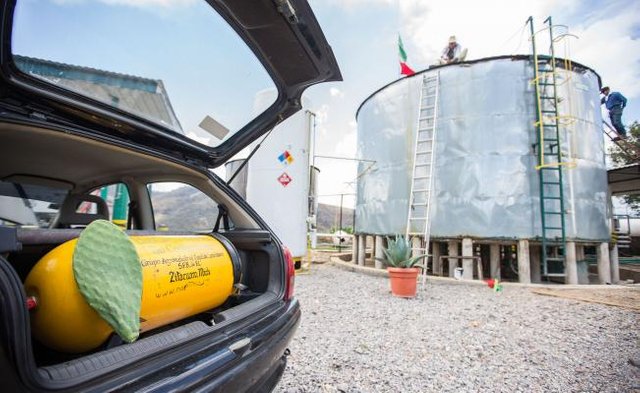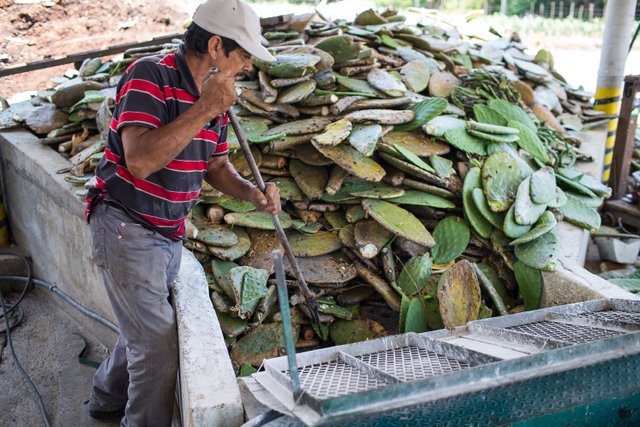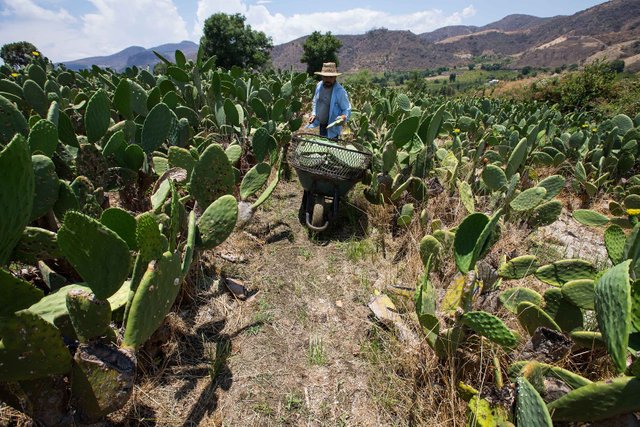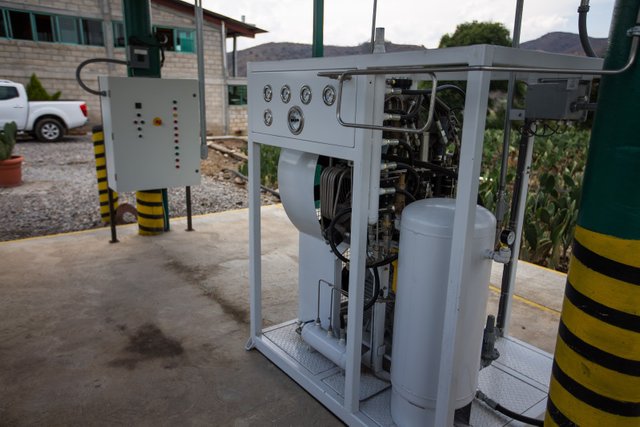The nopal-based gasoline that Miguel Aké Madera, 68, and Rogelio Sosa López, 66, created in Zitácuaro, Michoacán, costs 12 pesos; which represents a saving of 40% compared to the liter of Premium fuel that is currently around 20 pesos. This project has aroused the interest of international characters such as the former Minister of Energy of Indonesia, who wanted to buy the invention of Rogelio and Miguel, however they refused because "this invention is made by and for Mexicans," says Rogelio. According to data from the National Consumer Price Index, in June 2008 Magna gasoline had an approximate price of 7.17 pesos and in June of this year it costs 18.58, that is, in 10 years its cost rose 156%. If today we started using organic gasoline from Rogelio and Miguel, the cost of 2008 to the present would be only 36%.

Despite the visibility abroad and that in the National Plan 2013 - 2018 it is proposed “to contribute to improve air quality, and reduce greenhouse gas emissions through more efficient fuels,” Rogelio and Miguel have only received support. by the federal government once over 10 years. Even so, currently the partners are about to open to the public Nopalimex, its biogas distribution plant. “We use a Mexican cactus to replace the use of a polluting substance, while benefiting the economy,” explains Rogelio. In 2013, the Mexican Institute for Competitiveness approximated that in 2018 there would be 37 thousand 488 premature deaths and an accumulated economic loss of 20 million 300 thousand pesos caused by air pollution generated by cars.
"That is not possible, I will not evaluate that," was what his synodal told Miguel Aké when he presented his thesis on unconventional energies. It was 1982 and President José López Portillo had a speech of abundance that made oil the basis of the Mexican economy and energy. “In that year they called me crazy because López Portillo had announced that we lived in wealth because we swam in oil, so talking about renewable energy was madness,” Miguel recalls. He continued experimenting with organic products such as corn, barley and sugarcane, however in the cactus he found a high energy content. I just needed a partner to trust the project. Rogelio is of peasant origin. When he was young and worked long hours in the sun, he wondered if there was no other activity that could be done in the field. Since before founding Nopalimex worked in the corn and tortilla industry; When the prices of LP gas and gasoline increased, he saw his economy affected. “Throw away your guavas to plant nopales,” Miguel told Rogelio, who had a plantation of that fruit. At the beginning Rogelio had doubts but finally accepted and risked all his assets. "Ask him if he regrets today," Miguel jokes.

Since they met thanks to a mutual friend, Miguel told Rogelio that it was possible to generate energy capable of replacing LP gas from the cactus. However, Sosa López did not give up so easily, but comments “he convinced me because there were many guavas and nobody was willing to innovate, they wanted different results but it is not possible if the same is done”. Risking all your assets was not a simple decision, but he was encouraged because he says he does not understand people who have money and prefers to accumulate it before investing in something positive. “I am not afraid of being poor, the worst is over. My children have economic stability, I already served as a father and I want to use the rest to leave a good impact on the Mexican population, ”says Rogelio. Based on trial and error, Rogelio and Miguel created a variety of cactus from pollinating 150 different species of cactus; With this species they can harvest 600 to 800 tons per hectare, when the average harvest is between 200 and 800. That is, the production of Nopalimex is very profitable, in addition to that it does not affect the diet of Mexicans because it is not A variety intended for consumption. “Initially the goal was to produce nopal gas so as not to burn LP gas because it is very polluting and reduce costs to always have a standard price. When we did it, we thought we had already reached the goal but we realized that it was the beginning of so many benefits that the cactus has, ”says Rogelio. Isis Romero Ibarra, a PhD in Chemical Sciences, confirms that “it is very important to give added value to a national product, and taking into account that Mexico is one of the main nopal producers, there is a great advantage to exploit this resource.”

When Miguel entered the laboratory of the Technological University of North Aguascalientes, he noticed that he was facing an identical replica of the plant that he and Rogelio had built in Zitácuaro. Three years earlier, one of his employees borrowed the work truck to address some issues in Aguascalientes: he took the prototypes and sold them to Cruz Azul. As of 2012, Nopalimex and the cement company clashed to obtain the patent. In 2013 the Ministry of Agriculture, Livestock, Social Development, Fisheries and Food (Sagarpa) supported them with equipment for the biogas plant, that has been the only support they have had from the federal government. Two years later, the governor of Michoacán gave them less funding to test the operation of biogas in cars, but after that there was no further collaboration. In 2015, the Mexican Institute of Industrial Property (IMPI) informed them that it would not give them the patent because their proposal had no technological discovery.
To refute the decision, Miguel and engineer José Luis Arvizú, a researcher at the National Institute of Electricity and Clean Energy (INEEL), analyzed the IMPI report point by point and showed that innovation is in producing energy only with prickly pear cactus. In order for Nopalimex to obtain the patent, it was taken into account that it does not emit pollutants at any time during its production or use, which is why it is ecological; that the peasants do decent work without having to emigrate and that “the economy stays in the place of origin, not like the wind and solar energy that foreign teams come to Mexico, use our resources, take the money and here only remains shortage ”, explains Rogelio Although the federal government has not followed them up, that same year they were awarded the Labor Prize by the Ministry of Labor and Social Welfare in the agricultural sector for engineering applied in the production of biogas The doctor of Chemical Sciences, Ottmar Reyes, says that despite the path taken, the change from conventional gasoline to biofuels “will not be overnight because the automotive industry must adapt its designs so that cars can fully process the biofuel and that is something that will take time. ”

One hundred nopales, regardless of their size or condition, are taken to the mill for crushing; This is how the biogas production process begins. Subsequently, the mixture is transferred to a fermentation tank where bacteria and microorganisms break down the cactus in the absence of oxygen, generating methane. When the partners started with the project, the first results showed that the gas had harmful substances, to clean it they sought the help of the United Nations Industrial Development Organization (UNIDO). Ramiro Magaña, its national coordinator, sent the product samples to Vienna and the data showed that the product had a high amount of biomass, material capable of being transformed into fuel. Both contacted Dr. Jorge Huacuz
Thank you for sharing
Downvoting a post can decrease pending rewards and make it less visible. Common reasons:
Submit
Congratulations @jose619! You have completed the following achievement on the Steem blockchain and have been rewarded with new badge(s) :
You can view your badges on your Steem Board and compare to others on the Steem Ranking
If you no longer want to receive notifications, reply to this comment with the word
STOPDo not miss the last post from @steemitboard:
Vote for @Steemitboard as a witness to get one more award and increased upvotes!
Downvoting a post can decrease pending rewards and make it less visible. Common reasons:
Submit
Interesting article but it could be written better.
What's nopal? I couldn't even make out! Is that the name of the cactus?
So if you get a vote from @nopal4u, you should get happy? LOL!
Or we can rename it as @biogas4u ...ha ha ha!
Downvoting a post can decrease pending rewards and make it less visible. Common reasons:
Submit
Hello, @jose619! Thank you for sharing your awesome DIY/how-to article with the steem community. However, we've got a place for you where you can post similar articles and get rewarded fairly. Welcome to build-it
Build-it is a tribe on the steem that sharpens your #diy and #how-to skills, in an attempt to save more money for yourself.
The recommended tags required when creating a DIY artcle are #diy, #build-it. #how-to, or #doityourself. You'll get rewarded with BUILD tokens upon every valid post/project which can also be exchanged for steem on steem-engine when you use any of the recommended tags as well as posting via our website.
Need help? Live technical support on Discord or Telegram
This project is run and supported by our witness @gulfwaves.net. If you like what we do, click here to vote for us
Downvoting a post can decrease pending rewards and make it less visible. Common reasons:
Submit